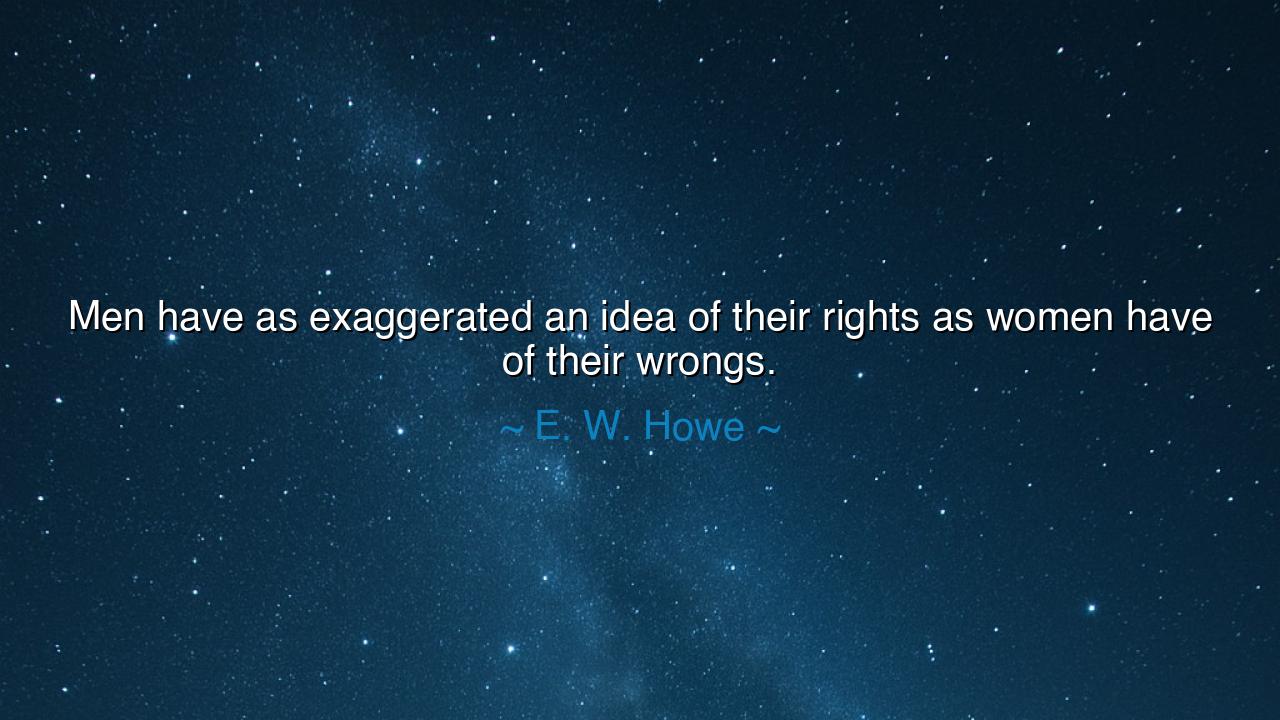
Men have as exaggerated an idea of their rights as women have of






The words of E. W. Howe, “Men have as exaggerated an idea of their rights as women have of their wrongs,” strike like the tolling of a great bell that echoes through the corridors of human pride. It is a statement born not from bitterness, but from the ancient balance of justice that forever wavers between man and woman, power and grievance, privilege and pain. Howe, a keen observer of society in the late 19th and early 20th centuries, saw clearly that each gender carried within itself a magnified sense of justification—men convinced of their rights to rule, to lead, to be obeyed, and women certain of their wrongs suffered, their injustices endured, their pains unheeded. Both views, though forged in truth, grow distorted when left unchecked by humility and understanding.
In this saying lies the reflection of an age-old tension that has shaped civilization itself. Since the dawn of patriarchy, men have seen themselves as the rightful bearers of authority—commanders of land, law, and lineage. They believed their dominance was ordained, their rights absolute. But in the shadow of that belief grew the quiet sorrow of women, who bore injustice in silence, until silence became strength, and strength became protest. Thus, Howe’s quote is not merely about gender—it is about human nature’s tendency to exaggerate its own suffering or justification. When a man clings too fiercely to what he believes he deserves, and a woman to what she believes she has been denied, the sacred balance of understanding is lost.
Consider the tale of the French Revolution, where the cry for “Rights of Man” rose like a storm. The people, long oppressed, demanded equality and justice. Yet soon, the righteous cry of liberty gave birth to the Reign of Terror, and those who once sought freedom began to commit the very atrocities they once condemned. The pendulum swung from tyranny to vengeance—proof that the human heart, when consumed by a sense of injury or entitlement, can lose sight of reason. Howe’s insight applies not only to men and women, but to all who let emotion cloud wisdom.
In a more personal sense, this truth unfolds in every household, every marriage, every friendship where two souls believe their own view is the truer one. The husband may cry, “I have given everything!” while the wife replies, “You have given nothing of what I needed!” Both may be right, and both may be blind. Each soul inflates its virtue and pain until the bond between them strains and cracks. It is in such moments that Howe’s words call for humility—a reminder that justice begins where exaggeration ends.
The quote’s power lies in its symmetry. Howe does not favor men or women; he mirrors them. In doing so, he holds up a looking glass where each sees their reflection, enlarged and flawed. This balance is rare in discourse, for many who speak of gender speak from grievance. But Howe speaks from observation—cool, measured, yet piercing. He reminds us that neither pride nor resentment can yield harmony. True progress, whether between genders or generations, comes not from claiming more ground but from understanding the ground we already share.
In the modern age, when the dialogue of rights and wrongs has grown louder than ever, his words still ring true. Men today fight against stereotypes that paint them as oppressors, while women fight against systems that still deny them equality. Yet if both sides see only their own pain, they build walls instead of bridges. The lesson, therefore, is not to silence either voice, but to refine them—to turn exaggeration into empathy, and conflict into communion. The measure of a just society is not how loudly each side defends its cause, but how deeply it listens to the other.
Let this teaching be passed down: whenever you feel most righteous, pause and ask yourself whether your sense of right has grown too large. Whenever you feel most wronged, ask if your wound has been magnified by pride. In that quiet moment of self-questioning lies the wisdom Howe wished us to find. The world will heal not when one side wins, but when both learn to see truth as a shared burden, not a private possession. Thus, let us strive to walk not in the glare of self-justification, but in the soft light of mutual understanding—for that is where justice truly begins.






AAdministratorAdministrator
Welcome, honored guests. Please leave a comment, we will respond soon